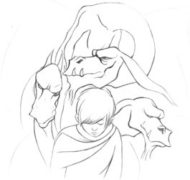I Have This Fantasy
Blog / Produced by The High Calling
I first read The Hobbit and the Lord of the Rings trilogy in college – the pirated American edition published in paperback in the late 1960s. I'd never read anything quite like them. Then I bought the officially sanctioned hardbacks, and read the four books again. I read them a third time right before the Fellowship of the Ring movie came out in 2001. (And I’ve seen all the movies at least four times, not to mention the DVD edition and the director’s cut edition, so I suppose I’m an official Ringhead.)
I read the Chronicles of Narnia only when my oldest became old enough to listen and understand the stories. He didn’t like to read but he loved being read to. So I did.
But fantasy, as a genre, was never something I pursued, until I read a contemporary novel and did a blog post about it. The author contacted me and asked if I would be interested in looking at the next book – a fantasy novel.
Fickle Readers
We readers are rather fickle. We go through phases, as publishers well know. We love espionage stories, until we don’t. Or novels about World War II until we find something else. Even Christianity Today had a recent article about Amish fiction being all the rage in both Christian and secular circles. In the 1970s, mystery novels were popular, including reprints from the 1920s and 1930s. Science fiction picked up with the Star Wars movies. But we’ll settle back down and find some new genre to pursue.
Other than J.R.R. Tolkien and C.S. Lewis, I’ve read three authors who write fantasy: Jeffrey Overstreet, with four novels in the Auralia Thread series; C.S. Lakin, with two novels in the Gates of Heaven series; and Ian Thomas Curtis, a new author with one novel in the Canticles of Andurun series. The three authors write in the fantasy genre, and they write or are writing in a series. They are all Christians but not necessarily “Christian authors” – they are authors who happen to be Christians, and their faith informs their writing but doesn’t overwhelm it.
Here’s the shortest review of seven novels you’ve ever read: they’re all highly imaginative and wonderful tales, and you should read all three authors if you haven’t before.
Three Things in Common
They write very different kinds of stories with very different plots, but they do have three things in common that speak to what fantasy is about and why it can be a powerful way to tell a story.
First, fantasy allows a suspension of belief that contemporary fiction or romance or mystery do not. In those stories, characters and especially settings have to be somewhat recognizable or the reader is going to have a difficult time. Fantasy provides a freedom for the author to create an entirely new and different world, even if certain conventions and the actions of characters are recognizable. That said, if you create a new and different world, you have to maintain a phenomenally tight control of your narrative, or you will lose your and the reader’s way very easily. So there is both a freedom and a control that characterize these works.
Second, fantasy novels suggest innocence, or a more innocent, less complicated time. All of three of the writers noted here have set their stories in a time which is vaguely medieval or Middle Ages, or at least had many of the trappings of that time. And while those times were in reality far from innocent, transposed on to a page of a fantasy novel they clearly suggest innocence. Good and evil are clearly drawn.
Third, fantasy affords what might be called “ease of evangelism.” The gospel message and many elements of Christian theology seem almost natural in a fantasy story, while they often seemed forced and awkward in many contemporary novels. Here, they become part of the story, and not necessarily in an explicit way because they don’t have to be. The suggestion of faith is sufficient: the reader knows what’s being described.
And fantasy stories, at least by these three authors, are simply great reads.
Author web sites:
Image by Jeremiah Langner. Used with permission. Post by Glynn Young.





